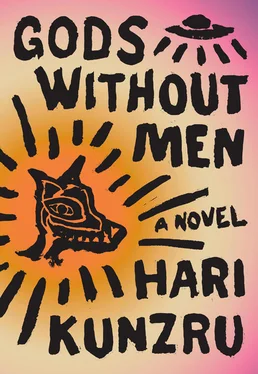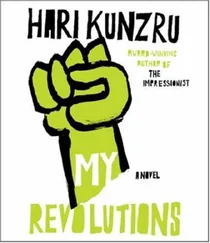“That it’s not Raj.”
“What are you trying to say?”
“It’s nothing. Don’t worry about it. I’m just tired.”
He realized that if he pushed it, he’d begin to scare her. He was scaring himself. The thoughts he was having weren’t normal. They weren’t appropriate. A voice in his head was whispering, softly, insistently— This is not my child, this is not my child, this is not my child …
So he went for walks, pushing Raj in front of him, willing the voice to shut up and leave him alone. Lisa was thriving. The house was littered with manuscripts and proofs of books with words in the titles like golden and pathway and revelation and light . She was talking openly about enrolling Raj in regular school. “He’ll be ready soon, I think,” she said. “He’s actually quite gifted.” One day Jaz found a stack of papers on the kitchen counter, details of expensive specialized IQ tests — the Otis-Lennon School Ability Test, the Stanford-Binet Intelligence Scales. He asked why she had them.
“I think,” she said, “we have to prepare our minds for the realization that the upside may be just as extreme as the down.”
“I don’t understand.”
“Our son is very special. He’s not an ordinary child.”
“A few months ago, he wasn’t even talking.”
“Jaz, come on. Can’t you see it?”
“See what?”
“Wow, you’re really a prisoner of your own negativity.”
“I’m just saying—”
“I know what you’re saying and I wish you’d stop. I can’t be around this energy. It’s draining, Jaz. It really is.”
The next morning his old assistant phoned with the news that Cy Bachman had been found dead. Walkers had discovered his body on a mountainside in the Pyrenees, an apparent suicide. Lisa phoned Ellis, who sounded, she said, absolutely distraught. They talked for a long time, while Jaz hovered in the background. According to Ellis, the failure of the Walter model had been a personal disaster for Bachman. He’d left without telling Ellis where he was going, though the site of his death, near the Spanish border town of Portbou, hadn’t come as a surprise.
Feeling empty, Jaz took Raj to see Dr. Siddiqi. Instead of letting the session start as normal, he told her he needed to talk. She settled herself in a chair opposite him.
“What can I do for you?”
“I know I should be happy about what’s happening. What’s happening with Raj, I mean. But I’m — I have a lot of questions. There’s so much we don’t know. To be honest, I’m scared.”
“Scared?”
He stared down at the carpet, suddenly ashamed by what he’d just admitted. Guiltily he glanced over at Raj, who was sprawled on the floor, surrounded by plastic farm animals. The boy was watching him intently.
Dr. Siddiqi waited patiently for him to continue. He could feel Raj’s eyes on him, a physical sensation, two little fingers pressed into the back of his neck.
“Look, Ayesha. I know this is strange, but I can’t really talk with him in the room. Is there anyone who can look after him for a few minutes?”
“Are you OK?”
“No, not really.”
She called a junior colleague, who took Raj into another office.
“So, Jaz, what is it? Talk to me.”
“This is insane. I know. And I know I shouldn’t be feeling like this. There’s probably a name for it. A syndrome. I’ve been under a lot of pressure. We all have. As a family. What I mean to say, is, I realize it’s probably something wrong with me, not him. But ever since he came back there’s been something different about Raj. He’s not the same kid.”
“It is unusual that he’s made all this progress, just after having gone through such a trauma.”
“No, I mean he’s not the same kid. It’s not Raj.”
“I’m not sure what you’re saying.”
“It looks like him, smells like him. It has his body. But it’s not him.”
“You’re saying you don’t believe this is your son?”
“He scares me.”
“Why? He’s a little boy.”
“He looks like a little boy. For all I know, maybe he is a little boy. I don’t know what he is. But he’s not Raj.”
She looked at him carefully.
“Jaz, have you been sleeping OK?”
“Sure. Well, not brilliantly. But not too badly. Why?”
“Anything else unusual?”
“Like what?”
“Anxiety?”
“Yes.”
“Any other disturbing thoughts? About your wife, for example?”
“No.”
“Have you been — hearing anything? Anything unusual? A voice, for example. Have you felt that people are talking about you behind your back?”
“A voice?”
“Yes. For example, a voice telling you things about Raj.”
“No. Not exactly.”
“Not exactly?”
“No. I mean no.”
“That’s good. But you say sometimes you feel afraid of Raj. Have you ever had the impulse to — defend yourself against him?”
“You mean hurt him?”
“Yes, I suppose that’s what I mean.”
“You think I’m going insane?”
“I’m not saying that. But you’ve come in here and declared to me that you think your son isn’t your son.”
“You think I’m a danger to him?”
He stood up.
“Please sit down, Mr. Matharu. Jaz. Please.”
She was holding her hands out. Suddenly he wanted to embrace her, to take handfuls of her long hair and pull her close to him, to kiss her full, blue-black lips, to push his tongue between her teeth. He took a pace forward, checked himself.
“I’m scared,” he said again.
“Jaz, I know you’ve been under incredible pressure. I must ask you again, do you ever have violent feelings toward your son?”
“No.”
“That’s good. That’s very good.”
“I just want to — know. Someone had him. Do you think it’s possible they — I mean — do you think he could have been replaced?”
“Replaced?”
“By a double. Something that’s like him in every way, except it’s not him.”
She frowned, and placed her hands back in her lap, a neat, deliberate gesture, the gesture of a woman composing herself, putting up her guard. He imagined her naked, a sheen of sweat across her back, her breasts. He felt wild, disturbed. If only she’d come to him. If only she’d touch him, it might be OK.
“No,” she said. “I don’t think that’s possible.”
Every moment is a bardo, suspended between past and future. We are always in transition, slipping from one state to the next. She’d had doubts over the years, wondering if this was where she really was, if this person Dawn even existed, or was just a momentary confluence of forces, a ripple on the pond. She’d pause as she made a bed or wrapped a scuffed water glass in a paper sleeve, sure there was something she’d forgotten, braced to find herself back in the dome on the night of the last ritual, falling away from the clear white light.
She shouldn’t have taken that New York woman up to see Judy, except the woman was so drunk and in such trouble already that it seemed like the best option. Judy had to help lay her out on a daybed, while Dawn told her what had happened, how some bastards off the base had gotten her out back of Mulligan’s and were fixing to run a train on her.
“And she’s got a husband, you say?”
“God knows what he’s doing, letting her go drink on her own in that place. Even with him it might not be so good, not in Mulligan’s. He’s from Pakistan, wears boat shoes. They got this retard kid.”
“As in touched? You think he’s got vision?”
“Hell, Judy. He’s a retard. He ain’t got no more vision than a dog. Look at the state of her. Sand all over her clothes.”
Читать дальше












